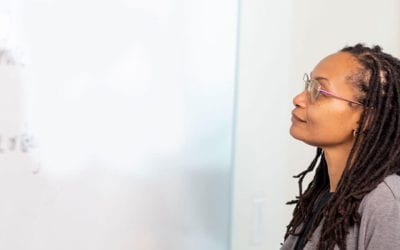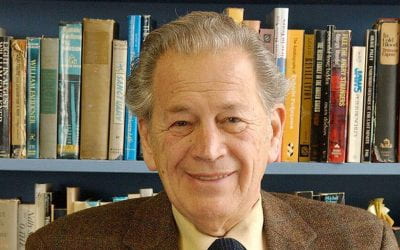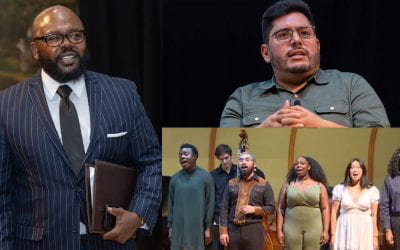New Tutors on the Block
College of Education Spotlightby Katy Cesarotti
It’s been many years since Roosevelt University junior Kayla Nelson graduated from fifth grade. Now every afternoon, she makes the trek to George Leland Elementary School on the West Side.
Nelson is one of 25 tutors working with students in a new partnership with Chicago Public Schools. Her K-3 students will devote an extra half an hour each day to early literacy skills, what parents called the greatest need after a year of pandemic learning loss.
“The tutoring program stood out to me because I have a passion for helping children reach their full potential,” said Nelson.
Nelson is pursuing a psychology degree with minors in sociology and women’s and gender studies. She dreams of working with people as a school social worker, psychologist or counselor. To her, the tutoring program seemed like a perfect way to get professional experience in a school.
“Some of my favorite moments so far have been getting to know the students,” said Nelson. “They always seem very excited to see me and spend their time working with me.”
The tutoring corps will reach about 250 students in 2021-22. In three years, Roosevelt hopes to reach 1,200 students across Chicago.

“Some of my favorite moments so far have been getting to know the students. They always seem very excited to see me and spend their time working with me.”
— Kayla Nelson
The pandemic reading cliff
Literacy is the key to unlocking learning in all school subjects. Without comfortable reading skills, students can struggle in their other classes on the road to higher education. Literacy gaps correlate with a lifelong loss in earnings compared to students’ peers.
After a year of remote learning challenges, students who don’t speak English as their first language or face other equity barriers need help with reading skills. Recent district data shows that fewer than one in five CPS third-graders read at grade level. The pandemic only worsened the gap. McKinsey estimates that by the end of the 2020-21 school year, Black and Latinx students were respectively six and five months behind in reading.
And it’s not just about test scores. During remote learning, young students missed important socioemotional learning opportunities. Kids couldn’t practice managing their emotions during a tough class assignment or sharing their markers with a friend. When CPS students meet daily with their tutors, they can build close relationships with someone outside of their family and get to practice those crucial skills.
“The best part is creating strong bonds and trust with the students,” said Nelson. “Knowing the students look forward to learning with me makes me feel accomplished and like I am making a difference in their lives.”
“This funding will provide deep and rich support for learners in the Chicago schools and help us to build innovative pathways to teacher licensure in Illinois.”
— Tom Philion, Dean of the College of Education
Building a better Chicago
Roosevelt was one of the winners of the Design Challenge from A Better Chicago. The organization fights poverty by leveraging the collective power of Chicagoans who want to make our city more equitable for everyone. Since 2010, A Better Chicago has raised more than $55 million for low-income, underserved communities.
“We are so grateful to A Better Chicago for their grant support,” said Tom Philion, dean of Roosevelt’s College of Education. “This funding will provide deep and rich support for learners in the Chicago schools and help us to build innovative pathways to teacher licensure in Illinois.”
Working with CPS, the tutoring corps works with schools that serve historically marginalized students. The program chooses partner schools based on their Child Opportunity Index, which ranks U.S. neighborhoods based on 29 factors like educational resources, healthy environments and economic opportunity.
Tutoring programs have cropped up across the country as educators grapple with the tentacular effects of the pandemic. In other cities, recruiters stalled when they ran into the labor shortage problems that have sidelined businesses across industries.
Monique Herard, assistant teaching professor of education policy, spearheaded Roosevelt’s efforts to hire tutors. After hearing from applicants, Roosevelt expanded funding to cover child care and other expenses that could prevent tutors from participating.

Strengthening the teacher pipeline
Nelson transferred to Roosevelt from a community college in her hometown. Since then, she’s built a strong network at the University and encouraged three of her friends to apply as well.
“I love Roosevelt University,” Nelson said. “I will always encourage my loved ones, close friends, and students to continue their educational journey for as long as they can. I would make sure they know that it is possible even if the odds are not in their favor.”
With a new path toward teacher licensure, the tutoring program hopes to help plug the growing shortage of teachers in Illinois. According to the state board of education, unfilled teacher positions have ballooned to 4,120 this year, more than double the 2017 total. The tutoring corps hopes to welcome some much-needed diversity into Illinois classrooms. Students benefit from having teachers and role models who look like them, but the teacher workforce is largely white and female, while Illinois students are growing more diverse.
Many Roosevelt tutors are first-generation college students from historically marginalized backgrounds themselves. After a year of remote learning, they can bring some understanding of what their young Chicago students are going through. As role models, they can also inspire hope.
“It’s important for me to provide a safe and welcoming learning environment to ensure my students feel comfortable,” said Nelson. “When I notice students are starting to understand and grow in their learning, it makes me realize how far they’ve come.”
More in this section
Standing up for what is right
The Untermyer Award honors Long’s many proclivities: nominees are professors who are prolific in their subject area, are innovative in the classroom and combine their teaching with activism.
Our Ted Talk: Remembering President Emeritus Theodore Gross
Ted Gross was a great leader. A man with transforming ideas, which he enthusiastically shared. He had great expectations for us. Above all, his legacy was defined by hope.
The City and The American Dream
Cities have served as key sites of economic innovation and growth, cultural self-expression, and central American ideas, such as the melting pot. This makes the city an ideal lens through which to think about the American dream, especially at Roosevelt University in the heart of Chicago.



